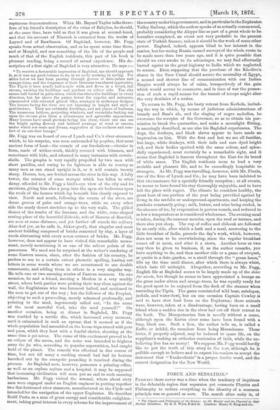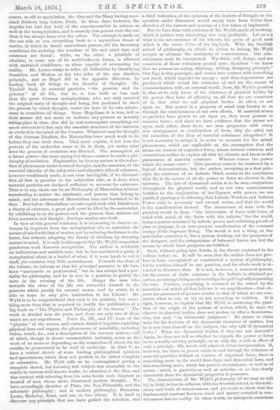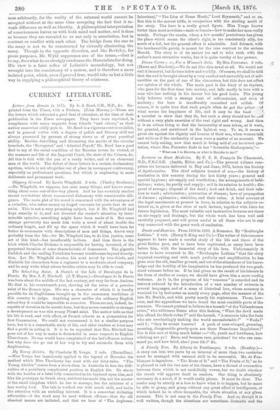FORCE AND SENSATION.* .
PERHAPS there never was a time when the tendency of inquirers in the debatable region that separates yet connects Physics and Philosophy to reduce everything to the identity of a common principle was so general as now. The search after unity is, of
• The Physic. and Philosophy of the Senses; or, the Mental and the Physical in their Mutual Relations. By R. S. Wyld, F.R.S.E. London: Henrys. King and Co.
course, as old as speculation, the One and the Many having exer- cised thinkers long before Plato. In these days, however, the impulse has laid fast hold of the experimentalist in science as well as the metaphysician, and is scarcely less potent over the one than it has always been over the other. The attempt is made on the one side to run everything back to a mysterious fount of matter, in which lie latent marvellous powers, till the favouring conditions for evolving the wonders of life and mind into real existence are found ; while, on the other, a principle of idealism, in some one of its multitudinous forms, is affirmed with unabated confidence, as alone capable of accounting for reality. Mr. Lewes essays to solve all difficulties by identifying Sensation and Motion as the •two sides of the one absolute principle, just as Hegel did in the opposite direction, by leading back all things to the identity of thought. Mr.
Tyndall finds in material particles "the promise and the potency" of all life, but he is less bold or less rash than the great German metaphysician, who not only asserted
the original unity of thought and being, but professed to show the process by which thought, under the laws of its own nature, came to constitute all things. Some Hegelians, it is true, tell us their master did not mean to indicate any process as actually taking place in time, (for did he not contemplate everything sub specie mternitatis?) but only the essential structure of the universe
as evolved in the mind of the Creator. Whatever may be thought of the German Idealists, the Materialists have much work to do
before they can rival them. They must explain, if not how the potentia of the molecules came to be in them, yet under what laws the process of evolution was directed. The assumption of a latent power—the mere saying it is there—cannot be made a phi- losophy of evolution. Explanation by its very nature is the reduc- tion of phenomena under terms of thought, and the assertion of the essential identity of the subjective and objective sides of existence, however confidently made, is not even intelligible, if we eliminate first all that is peculiar to the subjective side, as is done when material particles are declared sufficient to account for existence. That is to say, there can be no Philosophy of Materialism without transferring to matter the attributes and powers that belong to mind ; and the advocates of Materialism have not hesitated to do that. But before Materialism can take equal rank with Idealism as a theory of existence, a great gulf must be filled by the materialist, by exhibiting to us the powers and the process that, without aid from sensation and thought, develope matter into both.
In view of this general tendency, it is interesting to observe at- tempts by inquirers from the metaphysical side to assimilate the nature of mind with that of matter, not by reducing the former to the latter, but without adopting the theory of idealism by elevating matter to mind. It is only in this aspect that Mr. Wyld's somewhat ponderous work deserves recognition. The author is evidently an industrious and amiable man, but he has smothered a grain of metaphysical wheat in a bushel of what, if it were harsh to call it chaff, yet contains very little nourishment. Towards the close of the volume, he informs us that his principal pursuits in life have been "mercantile or professional," but he has always had a par- tiality for philosophy, and he is now in a position to gratify the taste in the evening of his life. Happy the man who towards the close of his life can surrender himself to the pursuits which gratify his natural tastes, and by which he is able to hope he may give instruction to his fellows ! Mr. Wyld is to be congratulated that such is his position, but some- thing more than that is required to justify the publication of a big book on "The Physics and Philosophy of the Senses." The work is divided into six parts, and there are only two of these which are not superfluous. Parts IL, III., and IV. treat of the "physics" of the senses, and contain detailed inquiries regarding physical laws and organs, the phenomena of sensibility, including vision, touch, &c., and a description of the nervous system,—all of which, though it shows commendable industry, must, as the work of an amateur depending on the researches of others for his results, be pronounced to be void of authority. In Part V. we • have a critical sketch of some leading philosophical opinions and speculations, which does not profess to be either complete or exhaustive. Mr. Wyld tells us he contemplated giving a complete sketch, but knowing this subject was accessible to the reader in various well-known works, he abandoned the idea, and was content with selecting from his note-books such chapters as treated of men whose views illustrated modern thought. We have accordingly sketches of Plato, the Neo-Platonists, and the scholastic philosophy ; and in modern philosophy, Descartes, Locke, Berkeley, Kant, and one or two others. It is hard to .discover any principle that can have guided the selection, and
a brief indication of the opinions of the leaders of thought on the question under discussion would surely have been better than sketches of the careers and systems of a few taken at haphazard.
But we have done with criticism of Mr. Wyld's mode of working, I which is neither very interesting nor very profitable. Let us st. e what is the net outcome of his labours, the grain of gocd seed which is the raison d'oltre of his big book. With the Scottish ' school of philosophy, to which he claims to belong, Mr. Wyld accepts as ultimate the testimony of consciousness. But con- sciousness must be interpreted. We think, will, design, and are conscious of these voluntary mental acts ; therefore "we know that we possess an acting, thinking, willing, designing principle." Our Ego is this principle, and comes into contact with something not itself, which impedes its energy ; and thus impressions are produced which reveal the existence of, and are the means of communication with, an external world. Now, Mr. Wyld's position is, that as we only know of the existence of physical bodies by the power they have of affecting us, all that we are conscious of is, that what we call physical bodies do affect or act upon 118. But power is a property of mind only known to us through the consciousness of our own efforts. If material atoms or particles have power to act upon us, they must possess or exercise force ; and since we have evidence that the atoms act upon each other, since there are new properties with every new arrangement or combination of them, why (he asks) not rid ourselves of the idea of material substance altogether? It is not necessary to accept it, in order to account for the actual phenomena, which are explicable on the assumption that the atoms are centres of organised force, whose various relations and connections suffice to explain all that we observe and know inthe phenomena of material existence. Whence comes the power which the atoms exert? This question cannot be answered by a logical demonstration, but the author, accepting as a first prin- ciple the existence of an Infinite Mind, comes to the conclusion that He is the source of all the power or force we observe in the universe. The law of dynamical action is to be seen everywhere throughout the physical world, and as our own consciousness testifies to the conjunction of intelligence with power, we are justified (perhaps) in inferring that Infinite Wisdom and Infinite Power exist in necessary and eternal union, and that the world is the manifestation thereof. The intercourse of man with the physical world is, then, "the intercourse of force with force, of mind with mind, of the finite with the infinite," for the world, being a system sustained by infinite power and exhibiting proofs of plan or purpose, is an ever-present manifestation of the constant energy of the Supreme Being. The world is not a thing, as the materialist conceives it, but a system working out the purposes of the designer, and the antagonisms of balanced forces are but the means by which these purposes are fulfilled.
Such, without going into details, is the theory explained in the volume before us. It will be seen that the author does not pro- fess to have excogitated or constructed a system of philosophy, for he confines himself to one position, and his whole work is in- tended to illustrate that. It is not, however, a reasoned system,
for the source of finite existence in the Infinite is obtained per saltum, no attempt being made to bridge the gulf logically separating the two. Further, everything is assumed at the outset by the
assertion—of which all that follows is an amplification—that ob- jects are possessed of powers similar to that of which we are con- scious when we act, or try to act, according to volition. It is right, however, to explain that Mr. Wyld, in answering the ques- tion of the origin of the powers of action, which, he says, we observe in physical bodies, does not profess to offer a demonstra- tion, but only "an inferential judgment." He seems to claim more for his doctrine of the dynamical character of matter, but he is not clear himself on the subject, else why talk of dynamical
bodies? What are dynamical bodies, if they are not material?
Again, he does not tell us whether he regards the power or force as an actually existing principle, or as only the result or effect of such a principle. His words will admit of either interpretation. If, however, the force or power exists in and through the relations of material particles defined as centres of organised force, there is ness arbitrarily, for the reality of the external world cannot be accepted without at the same time accepting the fact that it re- veals difference as well as identity. A philosophical interpretation of consciousness leaves us with both mind and matter, and it does so because they are revealed to us not only in association, but in contrast or conflict with each other. The bridge from the one to the many is not to be constructed by virtually eliminating the many. Though in the opposite direction, and like Berkeley, for pious purposes, Mr. Wyld suppresses one of the terms,—that is to say, does what he so strongly condemns the Materialists for doing. His view is a faint reflex of Leibnitz's monadology, but not wrought into the consistency of a system, and is therefore a mere isolated point, which, even if proved true, would take us but a little way in supplying a philosophical theory of existence.




































 Previous page
Previous page